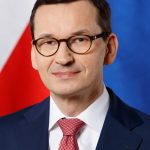Politics
Poland Politics
This page explores Poland’s political structure incorporating real-time RSS feed news and videos. By harnessing the power of RSS feeds, visitors can stay informed about the latest developments in Poland’s politics as they happen. The dynamic nature of these feeds ensures that users receive up-to-the-minute updates on political events, policy changes, and significant milestones, enabling them to stay abreast of the ever-evolving political scene.

Mateusz Morawiecki
Prime Minister of Poland
Incumbent
Assumed office
11 December 2017
Image credit
Poland, officially known as the Republic of Poland, is a country located in Central Europe. Here are some key points about the political structure in Poland:
- President: The President of Poland is the head of state and is elected by the citizens in a direct popular vote. The President’s role is largely ceremonial, but they have some important powers, such as the authority to veto legislation and appoint certain officials.
- Prime Minister: The Prime Minister is the head of government and is responsible for running the day-to-day affairs of the country. The Prime Minister is appointed by the President and is typically the leader of the party or coalition with the majority of seats in the Sejm (the lower house of the Polish Parliament).
- Parliament: The Polish Parliament is bicameral, consisting of two chambers: the Sejm (lower house) and the Senate (upper house). The Sejm has 460 members who are elected through proportional representation for a four-year term, while the Senate has 100 members elected for a four-year term.
- Government Formation: Following parliamentary elections, a government is formed by the party or coalition that holds the majority of seats in the Sejm. The Prime Minister is then nominated by the President and approved by the Sejm.
- Political Parties: Poland has a multi-party system with several political parties vying for seats in the Parliament. Some of the prominent parties include Law and Justice (PiS), Civic Platform (PO), Polish People’s Party (PSL), and Left (Lewica).
- Judiciary: The Polish judiciary is independent and plays a crucial role in upholding the rule of law. However, there have been concerns about the independence of the judiciary in recent years, with the European Union expressing criticisms over judicial reforms that could undermine the separation of powers.
- Local Government: Poland is divided into voivodeships (provinces), which are further subdivided into counties and municipalities. Local governments have significant autonomy in managing local affairs.
- International Relations: Poland is a member of the European Union (EU), NATO (North Atlantic Treaty Organization), and various other international organizations.
Unless other sources are listed, original content is provided by ChatGPT. ChatGPT may produce inaccurate information about people, places, or facts. #Poland #PolandPolitics #PolandNews #PolandNewsToday #PolandRSSFeed #BlahFace




